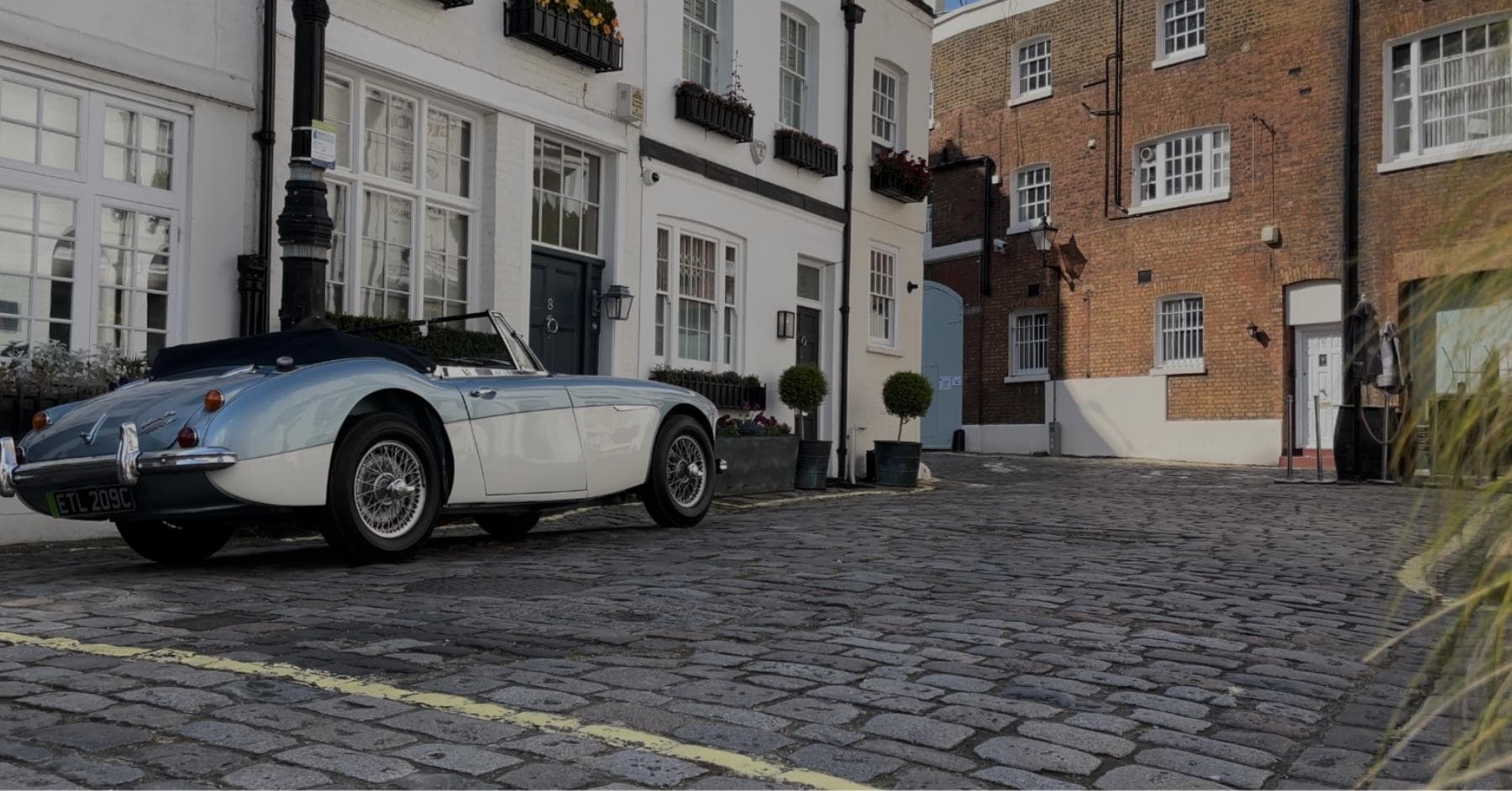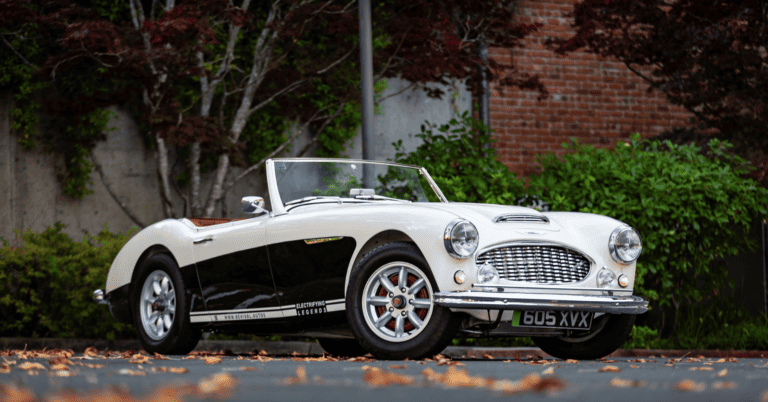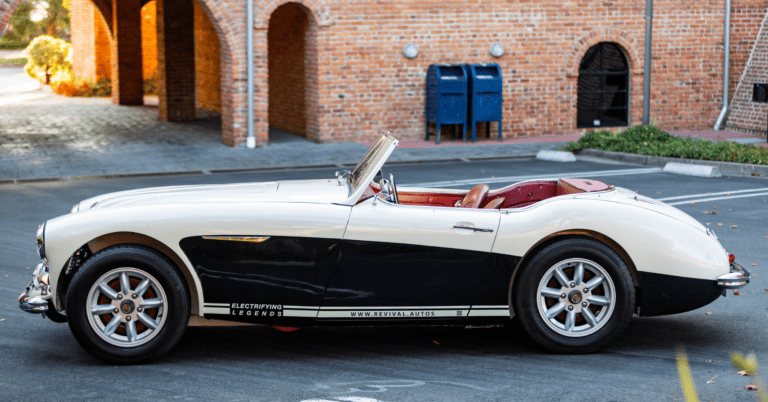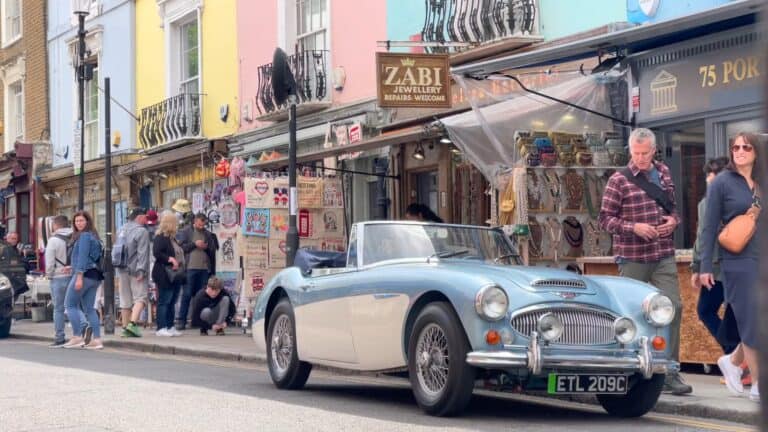In a world where the road to the future is paved with innovation, a fascinating crossroads emerges, where the timeless charm of classic cars converges with cutting-edge technology. Here, the past’s beloved icons are reborn as eco-conscious pioneers of the automotive world. Welcome to the realm of electric classic cars—a realm where nostalgia and sustainability harmonize seamlessly.
The Enduring Allure of Classic Cars
A Journey Through Time
Classic cars have always wielded a magnetic appeal. Their designs are portals to bygone eras, evoking sentiments of nostalgia and admiration. These rolling works of art transport us back to a time when automotive craftsmanship was a revered art form.
The Environmental Conundrum
However, this enduring love affair with classic cars has been tinged with a considerable environmental dilemma. The robust engines that once symbolized power and freedom were also notorious for their emissions. As our collective environmental conscience grew, so did the discord between classic car passion and eco-responsibility.
The Arrival of electric classic cars
Reviving the Classics
Electric classic cars represent the ingenious solution to this conundrum. They breathe new life into classic automobiles, replacing their traditional internal combustion engines with electric powertrains. This metamorphosis preserves their iconic aesthetics while ushering them into an era of clean, sustainable driving.
A Silent Revolution
One of the most enchanting aspects of electric classic cars is their silence. Instead of the cacophony of roaring engines, you’re greeted with a serene whisper as you embark on your journey. It’s a symphony of quiet elegance that enhances the overall experience.
The Advantages of Electrifying Classics
Championing Sustainability
At the heart of electric classic cars is a commitment to sustainability. They bid farewell to tailpipe emissions and embrace electricity as their fuel source. It’s a transition that dovetails seamlessly with the global push towards cleaner, greener transportation.
Financial Prudence
While the initial investment in converting a classic car to electric might raise an eyebrow, it’s essential to look at the broader financial perspective. Electric classic cars often come with lower operational costs. Electricity is generally more affordable than gasoline, and the reduced need for maintenance translates into fewer visits to the mechanic.
Performance Enhanced
Don’t let the vintage aesthetics fool you; electric classic cars often deliver exhilarating performance. Electric motors offer instant torque, resulting in brisk acceleration that can rival modern sports cars. It’s a blend of classic elegance and modern power.
Charging Ahead into the Future
Charging Convenience
Charging an electric classic car has become increasingly convenient. A growing network of charging stations means you can power up your vintage ride while enjoying a coffee break or exploring new horizons. Charging times vary but continue to decrease with technological advancements.
Impressive Range
The range of electric classic cars has evolved significantly. With improved battery technology, many can now travel substantial distances on a single charge. This makes them not only stylish showpieces but also practical daily drivers.
Maintaining the Legacy
Streamlined Maintenance
Maintaining an electric classic car is a breeze compared to its gasoline-powered counterpart. With fewer moving parts and no need for oil changes or complex engine repairs, you’ll spend more time on the road and less time at the garage.
Reliability Redefined
Electric classic cars are renowned for their reliability. Their streamlined design and reduced mechanical complexity mean fewer chances of breakdowns. You can confidently embark on road trips, knowing that your vintage ride will stand the test of time.
The Future of electric classic cars
As society continues to embrace sustainable transportation, the future of electric classic cars looks bright. They are poised to become iconic symbols of the transition towards cleaner, greener mobility. These electrified classics are not just relics of the past; they are ambassadors of a sustainable future.
Revival Autos: Pioneering the Transformation
Heritage Preservation
Revival Autos stands at the forefront of the electric classic car revolution. They specialize in preserving the heritage and aesthetics of classic cars while seamlessly integrating electric powertrains. Each conversion is a labor of love, ensuring that the essence of these vintage icons remains intact.
Driving Change
With Revival Autos, it’s not just about converting classic cars; it’s about driving change. It’s about breathing new life into the classics we adore and propelling them into a future where they can continue to inspire awe while treading lightly on our planet.
In the world of electric classic cars, the past elegantly merges with the future, and the result is a symphony of sustainable style. Its journey worth embarking upon a journey that invites you to experience the best of both worlds. So why wait? It’s time to step into the future, one electrifying classic car at a time.
Revival Autos
Revival Autos is a pioneering force in the realm of electric classic cars. With a passion for preserving automotive history while embracing sustainability, our team is dedicated to crafting exquisite conversions that seamlessly merge the timeless beauty of classic cars with cutting-edge electric technology. Each project we undertake is a testament to our commitment to a cleaner, greener future for classic car enthusiasts. Through meticulous craftsmanship and innovation, Revival Autos has earned a reputation as a trailblazer in the industry, ensuring that the legacy of iconic classic cars lives on while reducing their environmental footprint.
FAQs
What are electric classic cars?
electric classic cars refer to vintage or classic automobiles that have undergone conversion from traditional internal combustion engines to electric propulsion systems. This transformation entails replacing the conventional engine with an electric motor and integrating a battery pack and associated components to enable electric operation.
What are the advantages of electric classic cars?
The merits of electric classic cars include:
- Substantial reductions in carbon emissions and environmental impact.
- Lower operational costs due to the efficiency of electric motors.
- Quieter and smoother operation.
- Preservation of the classic car’s aesthetics while introducing modern, sustainable technology.
Are electric classic cars environmentally friendly?
Yes, electric classic cars demonstrate enhanced environmental friendliness compared to their gasoline or diesel counterparts. They emit no tailpipe pollutants, contributing to improved air quality and reduced air pollution. Moreover, they aid in diminishing the overall carbon footprint when charged with renewable energy sources.
What are the ecological benefits of driving an electric classic car?
The ecological advantages of driving an electric classic car encompass:
- Mitigation of greenhouse gas emissions.
- Reduced dependence on fossil fuels.
- Conservation of historically significant and classic vehicles.
What is the performance of an electric classic car like?
The performance of electric classic cars is notable. Electric motors deliver instantaneous torque, resulting in rapid acceleration and a quiet, seamless driving experience. Additionally, they often offer superb handling characteristics due to the low center of gravity achieved through strategic battery placement.
How does performance of electric classic cars compare to gasoline-powered ones?
Electric classic cars can provide superior performance. It can give enhanced acceleration and handling when compared to gasoline cars. But, factors such as range and charging infrastructure may vary. It can affect long distance travel capabilities.
How long does it take to charge an electric classic car?
Charging times for an electric classic car are contingent upon battery capacity and the charging equipment employed. Typically it can take several hours to attain a full charge. Fast charging stations can significantly reduce this time. For example, it can deliver an 80% charge in approximately 30 minutes.
How far can an electric classic car travel on a single charge?
The range of an electric classic car on a single charge is variable, hinging on the specific conversion and battery capacity. It can span from approximately 50 miles for some conversions to over 300 miles for high-end electric classic cars with larger battery packs.
What is the range of an electric classic car on a full charge?
The range of an electric classic car on a full charge can vary considerably, but typically falls within the range of 50 to 300 miles, contingent upon the particular conversion and battery capacity.
How long does the battery last in an electric classic car?
The lifespan of an electric classic car’s battery is contingent upon multiple factors, including usage patterns, temperature conditions, and battery quality. Generally, modern lithium-ion batteries can endure over 100,000 miles before experiencing noticeable capacity degradation.
Is maintaining an electric classic car challenging?
Maintaining an electric classic car can be less arduous and costly than maintaining a gasoline-powered counterpart. Electric motors feature fewer moving parts, necessitating less frequent maintenance, such as oil changes. Nonetheless, battery upkeep and potential replacement may be required over time.
Are electric classic cars dependable?
Electric classic cars are often regarded as more dependable owing to their simpler drivetrains and diminished wear and tear on components. However, reliability is also influenced by the quality of the conversion and maintenance practices.
Do electric classic cars retain their original value?
Electric classic cars can preserve or even appreciate in value, particularly if the conversion is executed meticulously while preserving the original aesthetics. Increasing interest in electric classic cars can contribute to their value appreciation.
Which company specializes in electric classic car conversions?
Numerous companies specialize in electric classic car conversions, including well-established entities such as Revival Autos.
Where can I have my classic car converted to electric?
Conversion of a classic car to electric can be carried out at specialized conversion shops, electric vehicle conversion companies, or by proficient DIY enthusiasts with the requisite expertise and tools.
How much does it cost to convert a classic car to electric?
The price for converting classic car to electric can vary considerably. It mainly is up to factors such as the vehicle’s make and model. It also depends on very very specific components that are used. The intricacy of the conversion process also costs a bit more. Costs can span from $10k to well above $100k
Are there government incentives for converting a classic car to electric?
In select regions, incentives or rebates may be available for converting classic cars to electric, although their availability varies by location. It is advisable to consult local authorities or environmental agencies for specific incentives.
Are there tax incentives for converting classic cars to electric?
Tax incentives for converting classic cars to electric may be accessible in certain areas, offering tax credits or deductions to offset conversion costs. Consultation with a tax professional or government agency is recommended for precise details.
What does the future hold for electric classic cars?
The future of electric classic cars appears promising as an increasing number of individuals embrace sustainable transportation. The electric classic car conversion market is likely to expand further, driven by advancements in battery technology and the evolution of charging infrastructure, enhancing their appeal.
How does Revival Autos contribute to the evolution of electric classic cars conversions?
Revival Autos isn’t just a part of the electric classic cars (ECCs) conversion industry; they’re leading the charge with a combination of technical brilliance and a deep passion for preserving the essence of classic cars. Their secret sauce? They seamlessly marry the soul of these vintage beauties with cutting-edge electric powertrains. In fact, they don’t just meet expectations; they consistently raise the bar, setting new standards for ECCs. As a result, Revival Autos is steering the course toward a sustainable and electrifying future for classic car enthusiasts and collectors alike.





